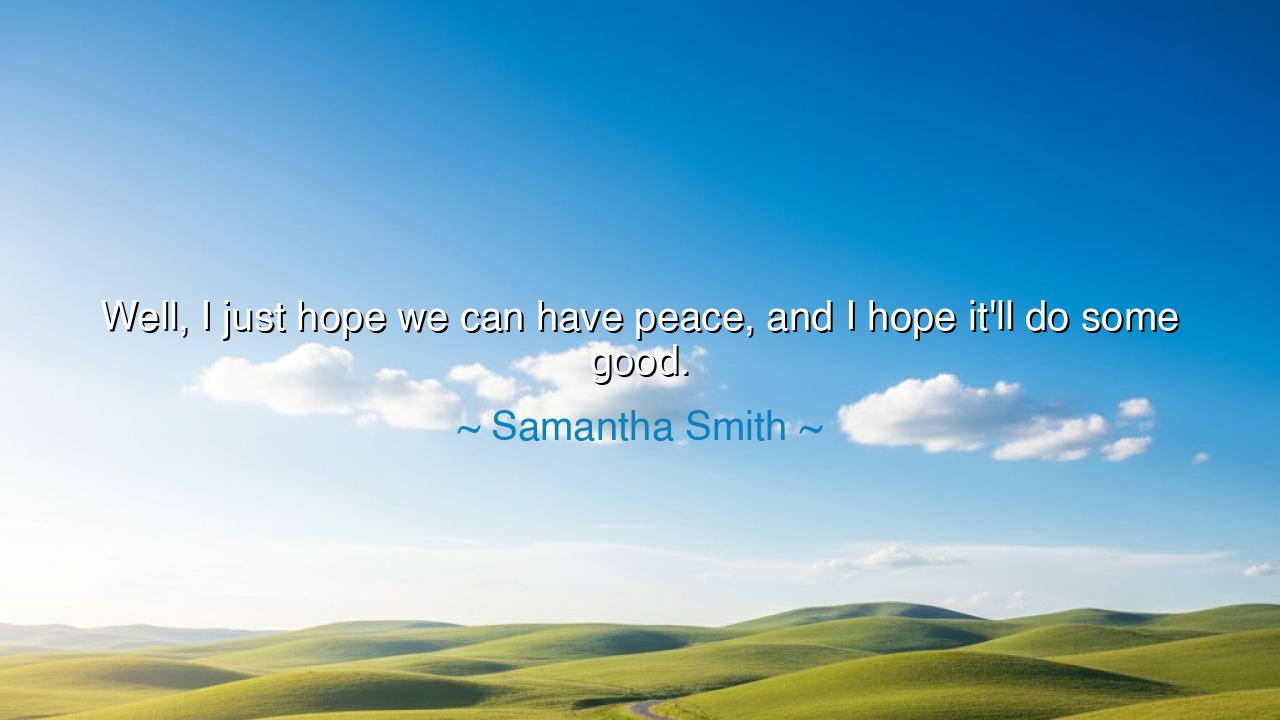
Well, I just hope we can have peace, and I hope it'll do some






In the tender and luminous words of Samantha Smith, the young messenger of peace, there rings the voice of innocence carrying a wisdom older than nations: “Well, I just hope we can have peace, and I hope it’ll do some good.” These words, spoken without calculation or politics, cut through the noise of ambition and power, reminding humanity of its most sacred longing — the desire to live without fear, to coexist without hatred. In them, the soul of a child speaks what the world’s leaders often forget: that peace, though fragile and humble, is the only soil from which goodness can truly grow.
The origin of this quote lies in one of the most remarkable acts of courage ever performed by a child. In the year 1982, during the tense days of the Cold War, when the shadow of nuclear destruction hung over the world, ten-year-old Samantha Smith from the United States wrote a letter to Yuri Andropov, the leader of the Soviet Union. She asked him, with the directness only a child could have, why his country wanted to wage war and whether the people of the Soviet Union truly desired peace. To the astonishment of the world, Andropov replied, inviting her to visit his nation. And so she did — a small girl traveling across the boundary of fear that divided East and West. Her words, spoken upon returning home — “I just hope we can have peace, and I hope it’ll do some good” — became a beacon, showing that even the smallest voice, when pure of heart, can reach across oceans of mistrust.
The ancients, too, understood that peace is not the absence of war, but the presence of understanding. When Lao Tzu wrote of harmony, he said that soft water wears down the hardest stone — not through violence, but through persistence. So it was with Samantha’s words: they were not the commands of an emperor or the declarations of a general, but the gentle drop of truth that reminded both nations of their shared humanity. Her hope, simple yet profound, reflected the eternal wisdom that goodness is not born in grand gestures, but in the quiet courage to care.
And yet, her message was not naïve — it was revolutionary. For to hope for peace in an age of fear is not the dream of the weak, but the defiance of the strong. In every era, those who speak of reconciliation are dismissed as idealists, yet history remembers them as the true builders of the future. Think of Mahatma Gandhi, who faced the might of an empire with nothing but his faith in nonviolence; or Martin Luther King Jr., who dared to dream of brotherhood in the midst of hatred. Like them, Samantha believed that goodness, once awakened, could ripple outward — one heart touching another, until even the walls of division began to crumble.
Her words remind us, too, that peace begins not in treaties, but in hearts. The wars of nations are but reflections of the wars within men — the battles of pride, greed, and fear. When Samantha said she hoped “it’ll do some good,” she was not speaking as a diplomat but as a child of truth. For every act of kindness, every word of compassion, every bridge of dialogue we build is a small thread in the vast tapestry of peace. Each of us holds that power, if only we choose to use it. Peace does not descend from the heavens; it is built, moment by moment, in the choices we make to forgive rather than fight, to listen rather than shout.
It is a tragedy that Samantha Smith’s own life was cut short at the age of thirteen, when she died in a plane crash. And yet, even in her brief years, she accomplished what many never do — she stirred the conscience of nations. Her legacy lives on not in monuments, but in the hearts of those who still believe that hope, though delicate, is stronger than despair. In her small hands, she carried the torch of humanity, and in her simple words, she left a truth that echoes through time: that the effort to create peace is never wasted, for every attempt to heal the world does some good.
So, my child of tomorrow, let Samantha’s words be your guide. When the world feels too vast, and its troubles too heavy, remember that even a single voice — your voice — can make a difference. Hope for peace, even when others doubt. Do good, even when the good seems small. Speak not with anger, but with compassion; act not for power, but for harmony. For in these simple acts lies the greatest strength of all — the power to change hearts, and through hearts, the destiny of the world.
And as you walk through the ages, remember this: peace is not a dream to wait for, but a duty to live. Every gesture of kindness, every word of understanding, every act of love — these are the seeds that will grow into the world Samantha hoped for. May you plant them well, and may they bear fruit that will outlast even the memory of war.






AAdministratorAdministrator
Welcome, honored guests. Please leave a comment, we will respond soon